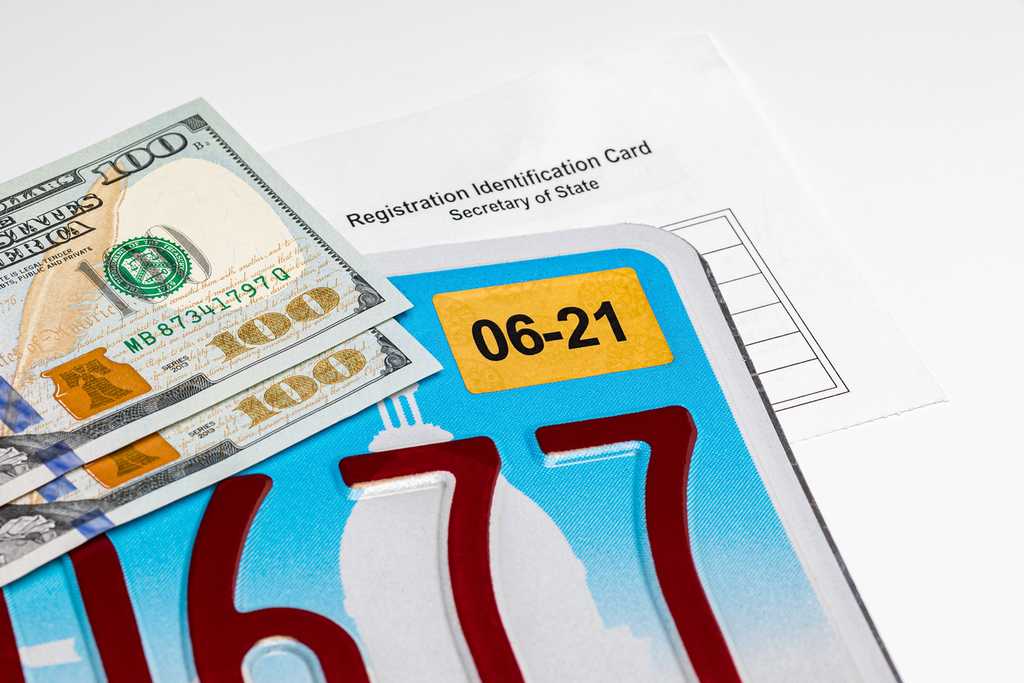If you’re the owner of a new or used car, it needs to be registered before you can legally drive it. Driving an unregistered vehicle is illegal, and it comes with serious consequences. Fortunately, the process of registering a vehicle is pretty simple. It requires some paperwork and a trip to your local DMV (Department of Motor Vehicles). In this guide, we’re going to explore what information is found on your registration, what forms are required to register your vehicle, and how much it will cost in your state.
What does car registration look like?
Car registration is a small piece of paper issued by your state’s DMV that lists essential information about you and your vehicle. Remember: the purpose of registration is to formally connect you with your vehicle. Though it can vary, the information displayed on your registration will generally include:
- Your vehicle’s make and model
- The year your vehicle was manufactured
- Your vehicle’s VIN (vehicle identification number)
- Some personal information, such as your name and address
- The name of your vehicle lender if you lease or finance your car
Your registration may look different depending on where you live. Most state DMVs will issue a small card that you can leave in your glovebox. You might also receive a registration sticker to put on your car’s window. This makes it clear at a glance whether your car is properly registered.
Before going to your local DMV, it is a good idea to research what information your state’s registration forms will require. In Arkansas, for example, registration forms require you to know some random facts about your car, like what type of fuel your vehicle takes, the number of axles it has, and its approximate weight.
How vehicle registration works
Once you’ve gathered all the information your state’s forms require, it’s time to head to the DMV. The office may have paperwork there for you, but you can often print it out ahead of time and bring it to the DMV already filled out.
You will have to pay a fee, which can be as low as $9.50 in Arizona or as high as $217 in Montana (for older vehicles). If everything checks out, you will likely be handed your registration on the spot.
Once you have the registration in your hand, you can legally drive your car. While it’s important that you’ve officially registered your vehicle, you must remember to keep your registration papers in your car at all times. If a police officer pulls you over and you don’t have your registration on you, you can be fined.
It’s also important to keep your registration up-to-date. Depending on the state you live in, you may have to renew your registration every one or two years.
How to register your vehicle
The process of registering your vehicle is fairly straightforward, but it helps to know what to expect ahead of time. Here’s a brief overview of how to register your vehicle:
- Gather your materials – Find out what information your local DMV will require from you to complete the registration forms. Most of this information is listed above, but it’s a good idea to look up what your specific state’s forms look like. You don’t want to get to the DMV and realize you’re missing important forms. Additionally, you may be required to show your driver’s license, proof that you have car insurance, and proof that your car passed a recent safety inspection.
- Plan your trip to the DMV – Before you go to the DMV, call ahead and make an appointment if you can. Lines at the DMV are often long, and it’s possible to make an appointment at many DMVs. If you bought your vehicle from a private seller, they may have given you their old vehicle registration. Consider bringing this to the DMV to make your visit easier. Don't forget to bring your car title to show ownership.
- Head to the DMV – Go to your local DMV and complete the provided vehicle registration forms. As noted earlier, it’s also possible to do this beforehand and show up with your forms already completed. Make sure to budget adequate time to spend at the DMV. Depending on your state, the process should only take about 15 minutes, but it will take much longer if you are filling out paperwork on the spot.
- Pay the fee – The fee to register your vehicle will vary by state and county. The DMV takes all types of payment, so you can use cash, a credit card, or a check to pay the fee.
- Store your papers in your glovebox – It’s important to have your new registration papers somewhere you can access them quickly in case you’re pulled over. When you have to renew your registration later on, bring these papers with you to expedite the process.
What does vehicle registration cost?
The cost to register your vehicle depends on where you live. Each state has its own method for determining your fee, from basing it on the value of your car, to charging a flat rate. Many of these states – and some counties within them – charge additional fees. Additionally, some states offer discounts to senior citizens and drivers with electric vehicles.
In the table below, we’ve outlined the registration fee in every state:
| State | Registration Fee |
|---|---|
Alabama | $23 flat rate |
Alaska | $100 flat rate |
Arizona | $9.50 + value-based fee |
Arkansas | Weight-based fee |
California | $46 + value-based fee |
Colorado | Value-based fee |
Connecticut | $80 flat rate |
Delaware | $40 flat rate |
Florida | $225 plus weight-based fee |
Georgia | $20 flat rate |
Hawaii | $45 plus weight-based fee |
Idaho | Vehicle age-based fee |
Illinois | $101 flat rate |
Indiana | $36.35 flat rate |
Iowa | Value-based fee |
Kansas | Weight-based fee |
Kentucky | $21 flat rate |
Louisiana | Value-based fee |
Maine | $35 flat rate |
Maryland | Weight-based fee |
Massachusetts | $60 flat rate |
Michigan | Value-based fee |
Minnesota | Value-based fee |
Mississippi | $15 flat rate |
Missouri | Horsepower-based fee |
Montana | Vehicle age-based fee |
Nebraska | $15 flat rate |
Nevada | $33 flat rate |
New Hampshire | Weight-based fee |
New Jersey | Weight-based fee |
New Mexico | Weight-based fee |
New York | Weight-based fee |
North Carolina | $36 flat rate |
North Dakota | Weight-based fee |
Ohio | $34.50 flat rate |
Oklahoma | Vehicle age-based fee |
Oregon | $43 flat rate |
Pennsylvania | $36 flat rate |
Rhode Island | Weight-based fee |
South Carolina | $40 flat rate |
South Dakota | Weight-based fee |
Tennessee | $23.75 flat rate |
Texas | $50.75 flat rate |
Utah | Weight-based fee |
Vermont | $76 flat rate for one-year registration; $140 flat rate for two-year registration |
Virginia | Weight-based fee |
Washington | $30 + extra based on several other factors |
Washington, D.C. | Weight-based fee |
West Virginia | $30 flat rate |
Wisconsin | $75 flat rate |
Wyoming | $30 flat rate |

